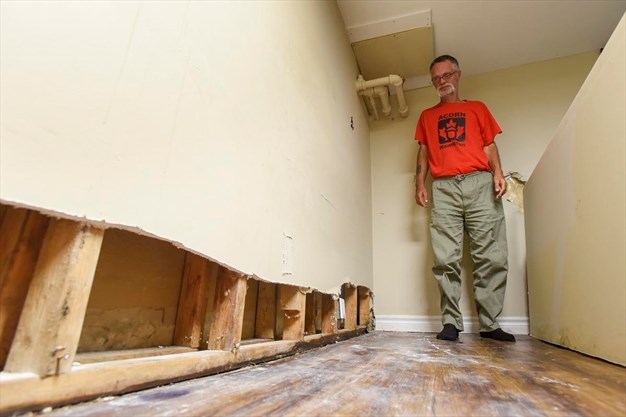Hamilton Spectator: Hamilton’s social housing wait list keeps growing
Posted September 17, 2018
City has struggled to keep up with repairs with inadequate funding from upper levels of government
Posted September 17, 2018
 Hamilton’s social housing wait list continues to grow as the city struggles to maintain existing units, let alone add to its aging stock.
Hamilton’s social housing wait list continues to grow as the city struggles to maintain existing units, let alone add to its aging stock.
The tally now sits at roughly 6,860 households, up from around 5,700 just over two years ago.
This represents about 16,650 people, whether they’re fleeing domestic violence, sleeping outside or wanting to transfer from one unit to another.
“We’re just chipping away at the fringes,” says Coun. Chad Collins about addressing the human and bricks-and-mortar backlog alike.
The wait list lingers as rents continue to spike in Hamilton, now two decades after Mike Harris’ provincial government dumped social housing onto municipalities amid deep cuts.
Hamilton city officials have reported it will cost $400 million over the next 20 years just to repair the existing housing stock, but there’s not nearly enough funding from upper levels of government.
CityHousing has just shy of 7,000 units in its portfolio. Overall, there are about 13,800 units, counting those of outside agencies such as Good Shepherd, Victoria Park Community Homes and Kiwanis.
In 2017, the average wait for one of these rent-geared-to-income units was 2.3 years.
Keith Alarie was on the list but says he became frustrated after viewing buildings that were “disgusting.”
“I just kind of gave up on them,” said Alarie, a member of the advocacy group Hamilton ACORN.
The 56-year-old’s application has since lapsed and he’s living in a leaky basement in a Wilson Street triplex near Sherman Avenue North.
“I just want to live a normal and healthy life,” said Alarie, who gets by on a $1,100-a-month disability pension.
He was among the 65 per cent on the wait list last year that represented one- and two-person households, placing the greatest demand on bachelor and one-bedroom units.
Finding appropriate units for everyone can be like putting together a “jigsaw puzzle,” says Collins, who’s president of CityHousing Hamilton.
Some on the list — 1,170 or 17 per cent — are already in social housing but waiting to be transferred to other units. This includes those who are “overhoused” or “underhoused,” which refers to people in units that are larger or smaller than what they need.
Most “shocking,” says Collins, are units unavailable due to disrepair. Right now, 109 are off-line for that reason; 80 of them are CityHousing.
“Those units are the poster children of the affordable housing crisis we have.”
But it has been worse, says Adam Sweedland, manager of social housing, noting that when he started on the file in 2016, the number hovered around 200.
In recent years, however, a “substantial” city capital investment helped bring more of them back online, Sweedland said.
The city also has 270 units on hold as it pursues redevelopment plans for complexes such as Jamesville and 500 MacNab St. N. in the North End.
The wait list isn’t desirable by any stretch, Sweedland says. “I don’t think it’s a great situation at all.”
But it’s growth this year and last can be attributed to increased efforts to identify those in precarious housing and make sure their applications are active, he says.
Another factor has been a greater emphasis on Housing First programs, which require participants to be on the wait list.
To make it on, an applicant must be deemed a “high-need household,” which is based on a maximum income that varies according to unit types. For instance, in Hamilton, it’s $16,200 or less for a bachelor and $20,400 for a one-bedroom.
The system also has tiers of priority that relate to urgency; people facing domestic violence are given first consideration.
The chronological list, which accounts for 73 per cent of all applicants, sees the earliest in line offered units as they become available.
In April, the city’s housing services division took over the administration of the wait list from DMS, a property management firm.
“One thing we have done is we have layered on a support worker,” Sweedland said.
This staffer is at the 350 King St. E. office to offer help for those having trouble navigating the system and can refer them to other services.
***
Article by Teviah Moro for the Hamilton Spectator
